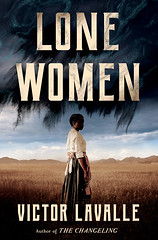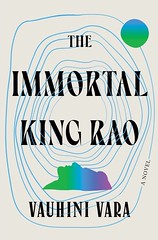 Our Missing Hearts
Our Missing Hearts
Celeste Ng
![]()
I had no idea what I was getting into with this novel, a book club selection. I expected family drama, but it turned out to be a near-future dystopia.
Thanks to my fellow book club members for selecting a reading that so perfectly meshes with my interests. The club knows I read and review books at the center of angry school board confrontations, that I publish regular news roundups about book challenges and bannings on my blog, Paul’s Thing. Lately, more and more of the news items I pass on are about libraries and librarians under threat. In “Our Missing Hearts,” the underground railroad for reuniting parents with their state-stolen children is run by librarians. I was instantly sympathetic.
Surprisingly, Celeste Ng, in her afterword, doesn’t get into why she chose librarians as underground heroes, instead focusing on the long and dismal history of state-sponsored childnapping as a way to keep troublesome populations in line. Which is a real thing, widespread and going on all around us, even in our not-so-exceptional-after-all America. But maybe she didn’t need to, because there they are, the librarians, at center stage. I will not be surprised to see “Our Missing Hearts” itself become the subject of challenges and banning attempts, once the pitchfork and torch brigades learn what it’s about.
Celeste Ng’s novel is totally believable, a slight extrapolation of social and economic trends we live with today. Just the other day I read a long thread on Twitter about how European populations passively went along with, and often actively assisted in, the rounding up of Jews by Nazis, so believably echoed here in the way a whipped population not only looks the other way but actively collaborates in the taking and re-placement of children (the missing hearts of the title) by the government. Particularly touching (and chillingly believable) are the hopes of parents of taken children, who believe knuckling under and going along will help get their kids back. A trend of violence toward, and physical attacks on, Asian-Americans is only slightly exaggerated here, and I’d argue not really exaggerated at all. Nope, everything in Celeste Ng’s dystopia is believable and well-founded.
So let’s hear it for the librarians!
 Lone Women
Lone Women
Victor LaValle
![]()
“Lone Women” is a horror novel with a bit of history to it and a theme made obvious by the title. I was drawn to it primarily for the locale; the northeastern corner of Montana, near the Canadian border, an area I lived and worked in decades ago, unforgettable for its harsh winters. Not a bad setting for a scary story.
It’s historically accurate to depict Black and Chinese women in the remote American West of the early 20th century; small in numbers but certainly there, and I don’t doubt Victor LaValle accurately describes the government land settlement and homesteading policies of the day.
As for the horror, I’ll just say the book is a page-turner. Normally I’d say I’m allergic to the genre, but I couldn’t put this one down. There, no spoilers, see? I knew I could do it.
A couple of things bothered me and I’ll note them here.
The story’s told by an omniscient narrator who echoes the language and diction of the novel’s characters, who live in the nineteen-teens. Mostly. Occasionally, though, the narrator shifts to a more contemporaneous, colloquial language, and I found it jarring. Just one example: after Mr. Reed, the wealthy benefactor of a small Montana town, helps kill a boy, he pauses to “get his act together.” Victor LaValle does this sort of code-switching several times, so it must be intentional. Whatever his reason for doing so, at least he avoids putting those words and phrases in the mouths of his characters.
Late in the novel we meet a mysterious couple who live high on the side of a mountain. They’re described as short of stature with such emphasis I wondered if they were quite human. They seem to have come north from Mexico or even farther south, and speak an indigenous language to Adelaide’s sister Elizabeth, whom (which?) they believe to be an ancient god of their people. The story could have gone in an interesting direction with this bit of additional background, but after Elizabeth is reunited with Adelaide neither the short couple nor her godhood are mentioned again.
Nevertheless. I’m impressed.
 Oh William!
Oh William!
Elizabeth Strout
![]()
I included this novel, along with four other Man Booker Prize finalists from 2022, in a poll for book club members, and the group selected it for our June 2023 reading and discussion. It wasn’t my personal choice; looking over publisher blurbs when putting the poll together, it seemed the lightest of the lot.
It’s really not about much. A formerly-married couple — she, in her 60s and recently widowed; he, in his 70s, alone again after his third wife left — go on a depressing road trip together to piece together previously-missing parts of his family history. It’s a learning experience for both of them, especially her. Or maybe I should say entirely her, since he’s an asshole apparently incapable of change and why she continues to answer his calls and come to his side would be a mystery except she explains all that over the course of the novel, along with so much more, in an uninterrupted stream of consciousness, insistent, chatty, intimate, insightful.
It’s not my sort of thing, but Elizabeth Strout’s writing speaks to me. I was rather put off, though, by Strout’s choice to make William and Lucy wealthy New Yorkers, Park Avenue types no less, eroding any sympathy I might have felt for either of them. Damn good writing, though.
 Prague Fatale (Bernie Gunther #8)
Prague Fatale (Bernie Gunther #8)
Philip Kerr
![]()
I haven’t quite warmed up to Philip Kerr’s Bernie Gunther novels, but I’m getting more comfortable with them. And that bothers me. Bernie’s not only front & center to the evils of the Final Solution, he’s directly involved, no matter the pains Kerr takes to show us Bernie’s heart isn’t in it or that he’s quietly opposed to Hitler and the Nazis. Quietly opposed or not, Bernie does participate; explicitly so in this novel, as, in the opening chapter, he recounts his involvement in the mass roundup and execution of Jews in Belorussia. He’s a good German — with all that implies — and it makes me squirm, as if I’m being co-opted by the evils of the Nazi regime.
I’ve read two other novels in the Bernie Gunther series, “If the Dead Rise Not” and “Prussian Blue.” The first, as with this novel, is a closed room mystery, à la Agatha Christie (Kerr gives her plenty of credit here, even depicting the top Nazi villain as a devoted fan who models his own crime on a Christie novel). The later novel was less so, and I enjoyed it more.
From my review of 6th novel in the series, “If the Dead Rise Not”:
Philip Kerr has a great hook: Bernie’s a German, investigating crimes in Berlin during the rise of the Nazi Party. I immediately thought of the great novels of Alan Furst and Martin Cruz Smith. When Alan Furst’s characters set out to spy on, frustrate, and impede the Germans during the 1930s and 40s, or when Martin Cruz Smith’s Arkady Renko gets involved in a politically sensitive criminal investigation in Moscow during the 1960s … history comes alive along with the characters on the page. When Philip Kerr’s Bernie Gunther uncovers high-level Nazi Party and American mob collusion during the bidding for the 1936 Berlin Olympics, the historical backdrop is just that, a backdrop, and the presence of several infamous Nazi bigwigs feels a bit like name-dropping.
From my review of the 12th novel, “Prussian Blue”:
“Prussian Blue” is chock full o’ Nazis (Kerr’s afterword reveals that, yes, most characters in the novel were historical figures, many of them close to Hitler), and here and there some “here’s what happened off page” explication worked into the dialog between Bernie and his interlocutors, but on the whole I enjoyed this novel a great deal more than the first. People often bring up Martin Cruz Smith and his character Arkady Renko as a comparison point with Philip Kerr and Bernie Gunther. Personally, I think Renko is a fuller and more human character. I know Kerr intentionally gives Gunther the values, attitudes, and prejudices of his day, but I have a hard time getting past some of that. That’s on me, not Philip Kerr.
“Prague Fatale” is the 8th Bernie Gunther novel and is closer to the 6th, “If the Dead Rise Not,” then it is to the 12th, “Prussian Blue.” By which I mean this novel is written more like the 6th than the 12th. Again, a closed room mystery with a lot of historical Nazi name-dropping, and to my irritation, a bit too much explaining at the end. I did like the twist with Bernie’s girlfriend Arienne, who turns out to be deeper and darker than he suspected; I hated Bernie’s Neanderthal attitudes toward women in general, but at least those are in keeping with his character and the times.
If you like Bernie Gunther, though, you might look up “Babylon Berlin,” 3 seasons of which ran on Netflix from 2017-2022 and are still available. These are set in the late 1920s, during the rise of Hitler and the Nazis, and I think you’ll find Gereon Rath, a young police inspector from Cologne who has been transferred to Berlin, more relatable than Bernie Gunther. There’s another Netflix series, “The Defeated,” set in the rubble of Berlin immediately after the Nazi surrender, that one had me looking for glimpses of Bernie Gunther around every corner. And there’s talk of an HBO series titled “Bernie Gunther, PI” … don’t know if it’s actually in development or just a wish, but it’s something to watch out for.
 Siblings
Siblings
Brigitte Reimann (translated by Lucy Jones)
![]()
I read the cult classic “Siblings,” first published in 1963 but only translated into English until this year, after reading a New Yorker review. I’ve long been a fan of Cold War tales of East/West espionage in Europe and North Korean defector memoirs. The ones I’ve read have all been written from a pro-West viewpoint; this is my first literary experience of the other side, written not only by an East German but an idealistic East German at that.
The publisher’s blurb might mislead some to believe the backdrop to Reimann’s story is the building of the Wall between East and West Berlin. Actually, the story unfolds before the Wall goes up. Her characters visit to West Berlin and discuss plans for future visits; one, Elizabeth’s brother Uli, announces a plan to simply walk into West Berlin to start a new life in the other Germany.
I wish Reimann had included the Wall in her story. She clearly was still writing “Siblings” when the Wall went up; I can’t help wondering whether it would have been a blow to her character Elizabeth’s idealism or whether she would have rationalized it as a necessary step to stop the drain of educated and valuable workers from the society she and her comrades are building.
Fascinating, reading a positive outlook of communism and the future of the DDR told by a committed young artist/worker. Fascinating, the details of life and work glimpsed through Elizabeth’s eyes. Fascinating, her views on the Other Germany and the West. Fascinating, too, her awareness of the limitations on her life, work, and future as a non-Party member, and her first-hand experience with behind-the-scenes political backstabbing (complete with a visit from the Stasi) and how she convinces herself it’s all part of building a workers’ state. I had to keep reminding myself, as I read, that at the time of Elizabeth’s story the DDR was but 14 years old; many of its citizens, especially young people like Elizabeth, were still believers.
Seeing the DDR through the eyes of a committed East German, one who in spite of signs to the contrary believes the future is bright and that communism will prevail, was a curiously satisfying experience. I feel my horizons have been expanded. I want now to discover more writing from behind the Wall.
 The Immortal King Rao
The Immortal King Rao
Vauhini Vara
![]()
I followed the story intently until it became apparent the author, in every third chapter, would revisit the Rao family’s early days in southern India. By that point the story had carried me beyond King Rao’s childhood and I no longer cared about it, character development be dammed. Vauhini Vara had already shown me King’s early days in America and his later life with Margie, with whom he co-founds Coconut, a Google- or Apple-like computer empire with globe-spanning fingers in every pie. I confess I soon started skimming over the flashback chapters, even skipping pages later on.
I was intrigued at first by the idea of a post-nation/state world, in this case made possible by King & Margie’s software, which takes the place of government and corporations in regulating commerce and services, even currency (apparently replaced by “social credits,” akin to social media influence and ranking), but Vauhini Vara doesn’t give readers much of a sense of what it would be like to actually live under such a system, save for eventually revealing that it devolves into the same old/same old, with haves and have-nots, etc. Worse, the glimpses she gives us of this future, so exciting at first, are soon replaced with pages of tiresome, didactic text, not a little Ayn Randish.
The really exciting stuff, the Harmonica and the Clarinet, get short shrift as well. There’s an interesting development at the end, when Athena starts to experience memories King never talked about in life, shameful & shocking things that would rock anyone’s foundations, but we never get to the foundation-shaking. We never learn how it affects Athena. The dang story just ends.
So many great ideas, some worthy of William Gibson, introduced but never followed up on. I hope Vauhini Vara revisits, develops, and humanizes some of them in future works.
 Please Report Your Bug Here
Please Report Your Bug Here
Josh Riedel
![]()
Mixed feelings about this one. I was excited about the science fiction hook of this novel, wherein users of a dating app who take exactly the right steps find themselves physically transported to other locations, both in this world and on others. But when we finally get details of the transporting medium, the “portals program,” it’s just magic, unexplained, at odds with everything known about physics. Josh, I wish you’d made an effort to come up with something even remotely believable … honestly, dude, it wouldn’t have taken much to satisfy me.
Anyway. We learn a lot about coffee shops and Golden Gate Park, both fleshed out with detail, personality, and character. People, less so.
How can it be that witnesses don’t faint dead away when a person right in front of them touches a mobile phone screen and literally depixelates and vanishes, then pops back into existence seconds later, excitedly talking about the hours and even days they just experienced in another dimension of time and space, off on the other side of the world or on another planet entirely? How is Henry, whose kindergarten-aged daughter fell through the portal four or five years ago, not insane with grief, frantic with worry, moving heaven and earth to get her back? The people aren’t just flat, they’re unreal. They do not act like any humans I know.
Why didn’t one of the A-list celebrities invited to beta test the portals program also, like Ting, take a one-way trip to another planet? How would the media cover something like that happening with Prince Harry? How would Google, er, “The Corporation,” handle the PR disaster? Because in the real world, we know this sort of thing would be earth-shattering.
As with Vauhini Vara’s novel, reviewed above: so many great ideas, some worthy of William Gibson, introduced but never followed up on. I wanted more. I was disappointed.